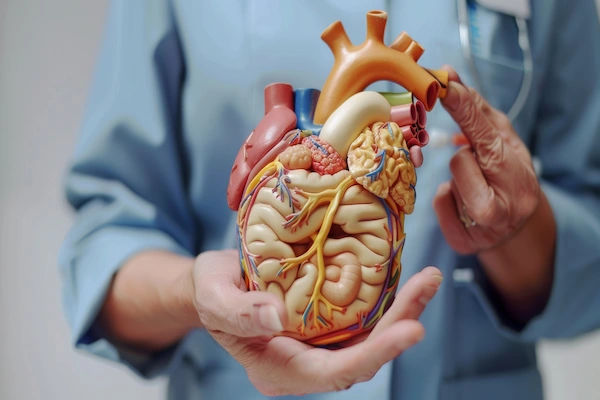- male
- 45 Years
- 22/01/2025
I've been keeping track of my blood pressure, and it usually falls between 130140 and 8090 over the last month. I'm not keen on starting any medication right now and wonder if I can get it back to normal with a healthy diet. I don't smoke or drink, and I sleep well. I weigh 86 kg and am working on getting it down below 75 kg. I'm thinking being overweight might be the only reason for my high BP since my sugar levels and kidney function are normal. I get mild headaches approximately once every two weeks. Do you think focusing on weight loss and diet could help stabilize my blood pressure?
Answered by 1 Apollo Doctors
Maintaining a healthy diet can definitely help in managing your blood pressure. In addition to a healthy diet, it is important to maintain a healthy weight and engage in regular physical activity. Since you are already working on reducing your weight, that is a positive step towards improving your blood pressure. While being overweight can contribute to high blood pressure, it is not the only factor. Other factors such as diet, physical activity level, stress, and genetics can also play a role in blood pressure levels. I get mild headache once in two weeks or so. Mild headaches can sometimes be associated with high blood pressure. However, it is important to monitor your headaches and consult with a healthcare professional if they become more frequent or severe. As you are not currently on any medication and prefer to manage your blood pressure through lifestyle changes, I recommend focusing on a diet rich in fruits, vegetables, whole grains, and lean proteins. Additionally, reducing your sodium intake can also help in managing blood pressure. Regular physical activity and stress management techniques can further support your efforts in maintaining a healthy blood pressure level.
Dr. Dhankecha Suggests...
Consult a Cardiologist
Answered 04/07/2025
0
0

More Cardiology Health Queries
View allI'm wondering if it's necessary to get an echo test for my mom. She's 47 and has slightly high cholesterol, but her ECG is normal. Should we be concerned about any potential heart issues, or is it okay to skip the echo test for now?
If your mother has high cholesterol and there are concerns about her heart health, it may be beneficial to get an echocardiogram (echo) done even if the ECG is normal. An echocardiogram is a test that uses sound waves to create detailed images of the heart and can provide valuable information about the structure and function of the heart. It can help assess for any potential heart conditions that may not be detected by an ECG alone. In this case, it would be advisable to consult with a cardiologist who can recommend the appropriate course of action based on your mother's individual health profile.
Answered by 1 Apollo Doctors
I've been having trouble sleeping lately because I'm experiencing shortness of breath and a rapid heartbeat at night. I also feel really weak. What could be causing these symptoms?
try exercising and reduce your stress levels
Answered by 1 Apollo Doctors
I've been having this pain on the left side of my chest and it's also in the inside part of my left shoulder, going to the back as well. It's weird because it's not the whole chest, just specific points. Sometimes the pain even jumps to my right side for a few seconds. I've been keeping an eye on my blood pressure and it's been 80120. Should I be worried about this or is it something that will pass on its own?
Based on your description of chest pain localized to specific points and radiating to the back, it is important to rule out any cardiac issues. However, given your age and blood pressure reading, it is less likely to be related to the heart. This type of pain could be musculoskeletal in nature, such as muscle strain or inflammation. I recommend taking over-the-counter pain relief medication such as Acetaminophen 500mg as needed for pain relief. Additionally, applying a warm compress to the affected areas and practicing gentle stretching exercises may help alleviate the discomfort. If the pain persists or worsens, it is advisable to consult a healthcare professional for further evaluation and management.
Answered by 1 Apollo Doctors
Disclaimer: Answers on Apollo 247 are not intended to replace your doctor advice. Always seek help of a professional doctor in case of an medical emergency or ailment.




